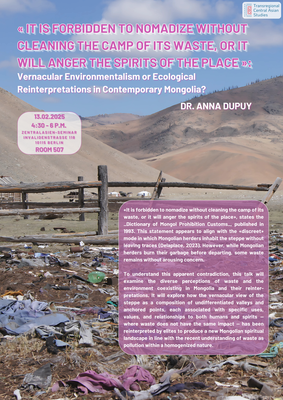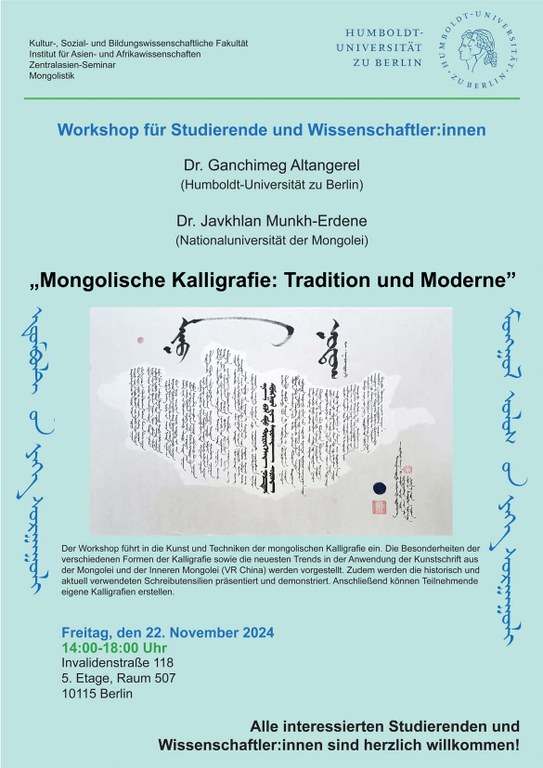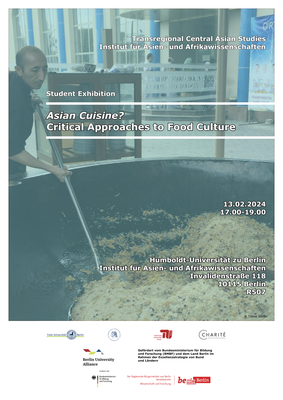Neuigkeiten
29.04. Lecture: "A shameful pain that makes you different: identity-building processes among Russian migrants in Kyrgyzstan"
This paper presents the results of ethnographic field research conducted in Kyrgyzstan between 2022 and 2024. The reasons for the emigration of Russian citizens from Russia following the full-scale invasion of Ukraine in 2022 can be broadly understood as political. In the vast majority of cases, these reasons involved some form of political statement—even something as simple as the refusal to participate in the conflict. Based on approximately 20 in-depth ethnographic interviews I conducted with relokanty, Russian war migrants in Kyrgyzstan, I aim to develop two claims in my presentation. First, ethnic Russians fleeing from Russia to Kyrgyzstan undergo a process of rapid ethnicization. They distinguish themselves from everyone else: the local population, local Russians, and also the Russians who remained in Russia. Second, one of the factors that unites this group internally is a specifically understood pain. This pain is existential in nature, and it is neither understood nor shared by others. The way my interviewees articulate this pain leads to a reinterpretation of what it means to be Russian today and may signal the emergence of an alternative Russian political identity. Dr. Kamil Wielecki, University of Warsaw
- https://www.iaaw.hu-berlin.de/de/zentralasien/neuigkeiten/termine/29-04-lecture-a-shameful-pain-that-makes-you-different-identity-building-processes-among-russian-migrants-in-kyrgyzstan
- 29.04. Lecture: "A shameful pain that makes you different: identity-building processes among Russian migrants in Kyrgyzstan"
- 2025-04-29T18:00:00+02:00
- 2025-04-29T19:00:00+02:00
- This paper presents the results of ethnographic field research conducted in Kyrgyzstan between 2022 and 2024. The reasons for the emigration of Russian citizens from Russia following the full-scale invasion of Ukraine in 2022 can be broadly understood as political. In the vast majority of cases, these reasons involved some form of political statement—even something as simple as the refusal to participate in the conflict. Based on approximately 20 in-depth ethnographic interviews I conducted with relokanty, Russian war migrants in Kyrgyzstan, I aim to develop two claims in my presentation. First, ethnic Russians fleeing from Russia to Kyrgyzstan undergo a process of rapid ethnicization. They distinguish themselves from everyone else: the local population, local Russians, and also the Russians who remained in Russia. Second, one of the factors that unites this group internally is a specifically understood pain. This pain is existential in nature, and it is neither understood nor shared by others. The way my interviewees articulate this pain leads to a reinterpretation of what it means to be Russian today and may signal the emergence of an alternative Russian political identity. Dr. Kamil Wielecki, University of Warsaw
- Wann 29.04.2025 von 18:00 bis 19:00
- Wo Room 507, Central Asian Seminar, Invalidenstr. 108
-
iCal
13.02.2025 «It is forbidden to nomadize without cleaning the camp of its waste, or it will anger the spirits of the place» by Dr. Anna Dupuy
- https://www.iaaw.hu-berlin.de/de/zentralasien/neuigkeiten/termine/13-02-2025-it-is-forbidden-to-nomadize-without-cleaning-the-camp-of-its-waste-or-it-will-anger-the-spirits-of-the-place-by-dr-anna-dupuy
- 13.02.2025 «It is forbidden to nomadize without cleaning the camp of its waste, or it will anger the spirits of the place» by Dr. Anna Dupuy
- 2025-02-13T16:30:00+01:00
- 2025-02-13T18:00:00+01:00
- Wann 13.02.2025 von 16:30 bis 18:00
- Wo Room 507, Central Asian Seminar, Invalidenstr. 108
- Name des Kontakts Dr. Anna Dupuy
-
iCal
«It is forbidden to nomadize without cleaning the camp of its waste, or it will anger the spirits of the place», states the _Dictionary of Mongol Prohibition Customs_, published in 1993. This statement appears to align with the «discreet» mode in which Mongolian herders inhabit the steppe without leaving traces (Delaplace, 2023). However, while Mongolian herders burn their garbage before departing, some waste remains without arousing concern.
To understand this apparent contradiction, this talk will examine the diverse perceptions of waste and the environment coexisting in Mongolia and their reinter-pretations. It will explore how the vernacular view of the steppe as a composition of undifferentiated valleys and anchored points, each associated with specific uses, values, and relationships to both humans and spirits — where waste does not have the same impact — has been reinterpreted by elites to produce a new Mongolian spiritual landscape in line with the recent understanding of waste as pollution within a homogenized nature.
22.11. WORKSHOP: Mongolische Kalligrafie - Tradition und Moderne
- https://www.iaaw.hu-berlin.de/de/zentralasien/neuigkeiten/termine/mongolische-kalligrafie-tradition-und-moderne
- 22.11. WORKSHOP: Mongolische Kalligrafie - Tradition und Moderne
- 2024-11-22T14:00:00+01:00
- 2024-11-22T18:00:00+01:00
- Wann 22.11.2024 von 14:00 bis 18:00
- Wo Invalidenstraße Nr. 118, 10115 Berlin, Raum 507 (5. OG)
- Name des Kontakts Ganchimeg Altangerel
-
iCal
Der Workshop führt in die Kunst und Techniken der mongolischen Kalligrafie ein. Die Besonderheiten der verschiedenen Formen der Kalligrafie sowie die neuesten Trends in der Anwendung der Kunstschrift aus der Mongolei und der Inneren Mongolei (VR China) werden vorgestellt. Zudem werden die historisch und aktuell verwendeten Schreibutensilien präsentiert und demonstriert. Anschließend können Teilnehmende eigene Kalligrafien erstellen.
13.02. Student Exhibition: Asian Cuisine? Critical Approaches to Food Culture
The X-Student Research Group ‘Asian Cuisine? Critical Approaches to Food’, an initiative of the Berlin University Alliance, is hosting its closing exhibition at the Institut für Asien- und Afrikawissenschaften on Tuesday, 13th February, 2024. The exhibition, in which participating students will present the results of their research projects from over the course of Winter Semester 2023/24, invites visitors to question existing representations of Asian cuisine, introducing them to critical understandings of dishes such as miso, pilau, and Mongolian milk tea, and ultimately reflecting on how we experience cultures through food. The exhibition will take place from 5 to 7 p.m. in Room 507 (5th Floor). No registration required. All welcome! Time: 13.02.2024, 17.00-19.00 Location: Invalidenstr. 118, R507, 10115 Berlin
- https://www.iaaw.hu-berlin.de/de/zentralasien/neuigkeiten/termine/student-exhibition-asian-cuisine-critical-approaches-to-food-culture-1
- 13.02. Student Exhibition: Asian Cuisine? Critical Approaches to Food Culture
- 2024-02-13T17:00:00+01:00
- 2024-02-13T19:00:00+01:00
- The X-Student Research Group ‘Asian Cuisine? Critical Approaches to Food’, an initiative of the Berlin University Alliance, is hosting its closing exhibition at the Institut für Asien- und Afrikawissenschaften on Tuesday, 13th February, 2024. The exhibition, in which participating students will present the results of their research projects from over the course of Winter Semester 2023/24, invites visitors to question existing representations of Asian cuisine, introducing them to critical understandings of dishes such as miso, pilau, and Mongolian milk tea, and ultimately reflecting on how we experience cultures through food. The exhibition will take place from 5 to 7 p.m. in Room 507 (5th Floor). No registration required. All welcome! Time: 13.02.2024, 17.00-19.00 Location: Invalidenstr. 118, R507, 10115 Berlin
- Wann 13.02.2024 von 17:00 bis 19:00
-
iCal





